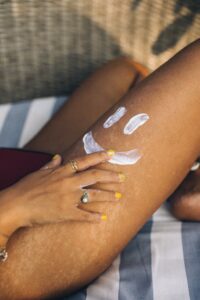Learn How to Treat and Prevent Sun Damage

The sun is a powerful force, providing light and warmth that sustains all life on earth. However, the same rays that give us a healthy tan can also be harmful to our skin. Over time, exposure to the sun’s ultraviolet (UV) rays can cause damage to the skin, leading to premature aging, wrinkles, and even skin cancer. Fortunately, there are steps you can take to protect your skin from the sun’s harmful rays and prevent sun damage. In this blog post, we’ll explore some of the best ways to treat and prevent sun damage to your skin.
Use Sunscreen
The most important step you can take to prevent sun damage to your skin is to use sunscreen. Sunscreen protects your skin from the sun’s harmful UV rays by absorbing or reflecting them before they can penetrate your skin. When choosing a sunscreen, look for one that has an SPF (sun protection factor) of at least 30 and provides broad-spectrum protection against both UVA and UVB rays.
Apply sunscreen generously to all exposed skin, including your face, neck, and hands, at least 15 minutes before going outside. Reapply sunscreen every two hours, or more often if you are swimming or sweating. Don’t forget to apply sunscreen to your lips, as they can also be damaged by the sun.
Seek Shade
Another way to protect your skin from the sun’s harmful rays is to seek shade whenever possible. If you’re going to be outside for an extended period, try to stay in the shade of a tree or umbrella. Avoid being outside during peak sun hours, which are typically between 10 a.m. and 4 p.m., when the sun’s rays are the strongest.
Wear Protective Clothing
Wearing protective clothing is another way to prevent sun damage to your skin. Clothing can provide a physical barrier between your skin and the sun’s harmful rays, reducing your exposure to UV radiation. Look for clothing that is made from tightly woven fabric and has a UPF (ultraviolet protection factor) of 50 or higher. You can also wear a wide-brimmed hat to shade your face, neck, and ears, and sunglasses to protect your eyes from UV radiation.
Stay Hydrated
Dehydration can make your skin more susceptible to sun damage, so it’s essential to stay hydrated when you’re spending time outdoors. Drink plenty of water throughout the day, and avoid alcohol and caffeine, which can dehydrate you. You can also eat water-rich foods like fruits and vegetables to help keep your skin hydrated from the inside out.
Use After-Sun Care Products
Even if you take steps to protect your skin from the sun, it’s still possible to develop sun damage. If you do get a sunburn, it’s essential to treat your skin properly to help it heal. After-sun care products like aloe vera gel or a cooling lotion can help soothe sunburned skin and reduce inflammation, like the Vanilla Bean Nourishing Body Cream from 100% PURE, which contains aloe vera. You can also take over-the-counter pain relievers like ibuprofen to help relieve pain and reduce inflammation.
Moisturize Your Skin
Sun damage can dry out your skin, making it more prone to wrinkles and other signs of aging. To help prevent this, it’s essential to moisturize your skin regularly. Look for a moisturizer that contains ingredients like hyaluronic acid or glycerin, which can help your skin retain moisture. You can also use a moisturizer that contains antioxidants like vitamin C or vitamin E, such as the Retinol Restorative Overnight Balm, which can help protect your skin from free radical damage caused by UV radiation.
Don’t Smoke
Smoking can damage your skin in several ways, including increasing your risk of wrinkles and other signs of aging. It can also make your skin more vulnerable to sun damage by reducing blood flow to your skin and limiting your skin’s ability to heal. If you’re a smoker, quitting can help reduce your risk of sun damage and improve your overall health.
Get Regular Skin Checkups
Regular skin checkups are essential for the early detection and treatment of skin cancer. If you have a family history of skin cancer or have had skin cancer in the past, it’s essential to get regular checkups with a dermatologist. During a skin checkup, a dermatologist will examine your skin for any unusual moles or spots and may recommend further testing or treatment if necessary.
Use Retinoids
Retinoids are a type of vitamin A that can help reduce the appearance of fine lines, wrinkles, and other signs of aging caused by sun damage. They work by stimulating the production of collagen, which can help improve your skin’s texture and elasticity. You can use a retinoid cream or serum to help reverse sun damage and improve the overall health of your skin.
Be Consistent
Finally, the most important thing you can do to prevent sun damage to your skin is to be consistent with your sun protection routine. Use sunscreen every day, even on cloudy days, and reapply it often. Seek shade when possible, wear protective clothing, and stay hydrated. By taking these steps consistently, you can help protect your skin from sun damage and keep it healthy and youthful-looking for years to come.
 In conclusion, preventing sun damage to your skin is crucial for maintaining healthy, youthful-looking skin. By using sunscreen, seeking shade, wearing protective clothing, staying hydrated, using after-sun care products, moisturizing your skin, not smoking, getting regular skin checkups, using retinoids, and being consistent, you can help protect your skin from the harmful effects of the sun. By taking care of your skin, you can enjoy the benefits of the sun while minimizing the risks.
In conclusion, preventing sun damage to your skin is crucial for maintaining healthy, youthful-looking skin. By using sunscreen, seeking shade, wearing protective clothing, staying hydrated, using after-sun care products, moisturizing your skin, not smoking, getting regular skin checkups, using retinoids, and being consistent, you can help protect your skin from the harmful effects of the sun. By taking care of your skin, you can enjoy the benefits of the sun while minimizing the risks.

